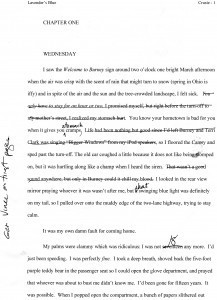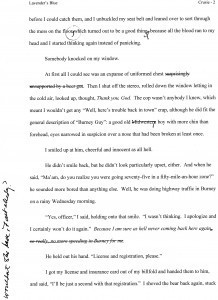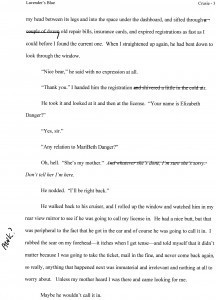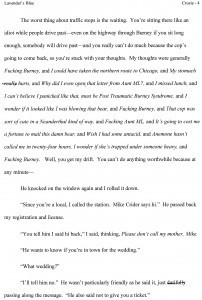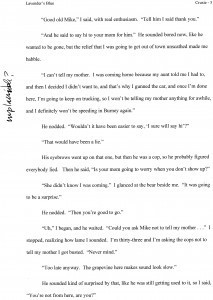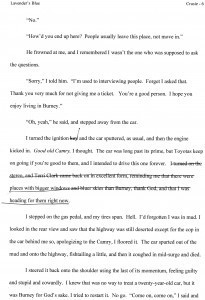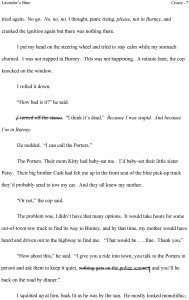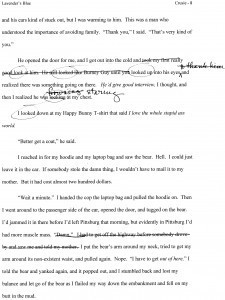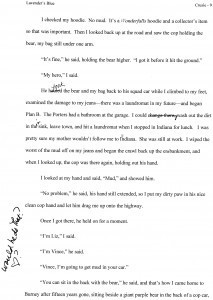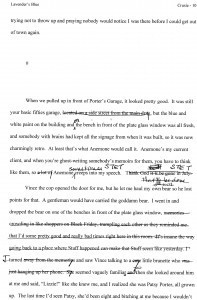Jennifer Crusie's Blog, page 309
June 7, 2012
The 12 Days of Liz: Day Nine: The Words and Me
I know some of you don’t read the comments so you missed me mugging an Argh Person. Then the comments after my mugging post seemed to imply that you were leery of commenting on the scene in the PDF pages. Can’t IMAGINE why. So this is to clarify, and if you’ve read the comments, it’s repetitive, so sorry about that. Also, I very much want to emphasize THIS IS NOT DIRECTED AT ANY ONE PERSON. It’s my thoughts on something that’s very, very common in both the writing community and in publishing, and I have very strong feelings about it, but I’m not mad at anybody. Actually, I’m grateful to the person who wrote the original comment because I think this is a good discussion. Also I’m swamped today and if it wasn’t for this post, I’d have scanned in the second scene. One look at a marked up manuscript may be interesting, but two is just depressing as hell. Most important: nobody should feel bad or guilty or anything else about this post. It’s not about you. It’s about me. Which is the way it should be (g).
So first of all, you can say anything you want about anything I put up here. I may argue, but you’re not stepping over a line. If I put it up here, it’s fair game for comments. It’s nice if you can tell me why you don’t like something, if you can zero in on the problem and describe it, but even if all you say is, “I don’t think that works,” it tells me what to look at again.
However, don’t rewrite. Think of it as taking the paintbrush from the hand of a painter and fixing her painting for her, or spanking the child of somebody you see in a store to fix the kid’s tantrum for her. It’s tempting, but you just don’t do it. It’s the same thing with writing. A lot of writers are obsessive about words because the right word is crucial, the right rhythm in a phrase is crucial, the right break in a paragraph is crucial, and only that writer can tell how those choices should be made. Mark Twain said, “The difference between the right word and the almost right word is the difference between lightning and a lightning bug,” but what he didn’t add was that the only person who knows the right word is the original author.
If you have a critique partner who rewrites your stuff, tell her to knock it off now. If she wants to write a book, she can write her own. That’s what I told the editor who put seventeen adverbs into a book of mine once. I was so furious that when the senior editor at that publishing house e-mailed me and said, “We weren’t happy with what you said to X,” I said, “I’m not happy with what X did to my book and you’re not publishing it that way. Tell me how much I owe you because I’m buying it back.” I had a new editor within the hour. Do not let editors fuck with your work just because they think they know your story better than you do. (And no it wasn’t because I had a lot of power. It was my third book, nobody knew who I was, and I was still learning the business.)
That sanctity of words is also the reason I left my first publisher; the company rewrote their contracts to say that they could change anything in the books they bought. I said no. My editor had four proposals in front of her that she’d approved but that hadn’t gone to contract–the sequels to Manhunting, Getting Rid of Bradley, Anyone But You, and What the Lady Wants (Cake Love, can’t remember the title of the second one, Jane Errs, and Newton, the Rat with Women)–and I couldn’t sign them because they wouldn’t take that clause out. She was wonderful, she really fought for me, but when the legal department was adamant, she said, “Look, I can promise I’ll never change your story.” i don’t think she ever understood that stories are the easy part. You can give two writers the same story and they’ll come up with vastly different books. Shakespeare stole every story he ever wrote; he wasn’t great because of his stories, he was great because of his words, which is why “A rose by any other name would smell as sweet” has lived for hundreds of years, while “I don’t care who your daddy is” probably wouldn’t have lasted the weekend.
I’m not Shakespeare. Most days I’m not even Jennifer Crusie as you can see by the marked up pages I posted earlier. It takes a helluva lot of rewriting to get to bad Crusie, let alone good Crusie. But the principle is the same: it’s the words, honey, and the way they go together. I should have said this a long time ago, it’s an important thing to reinforce because when the words are violated, the writer is injured, and too often we don’t fight for our books and just take the wounds. (Not me, I’m impervious, so NO GUILT ANYWHERE). I know two excellent, excellent writers whose editors rewrote their books to such an extent that they quit writing; their hearts were just broken by the books that were published. One of them finally came back and is working with an editor who respects her prose (which is excellent) and she’s back on track again. The other one, one of the most brilliant writers I’ve ever known, hasn’t written since and I don’t think she’s ever going to again. She hasn’t published for years and people still ask about her, she was that good. You can argue that she should have been tougher than that, but I’d argue that with a good editor who respected her writing, she wouldn’t have had to be tough, she could just have been an excellent writer who gave pleasure to everyone who read her work. This is one reason why I will write for Jennifer Enderlin until the day I die.
One of my best friends in the business has a mantra: Protect the work. I think too often we’re too uncertain about our work, and especially in the beginning when it seems like we’re powerless, just trying to learn, we let other people mess with our words. That’s not the same as letting other people comment on our stories, that’s critiquing. But if we let other people change our words, we’re letting them into the story, and they don’t belong there. More than that, we’re failing to protect the story. The only protection your story has from the outside world is you. You have a responsibility to it. Even if that means mugging the innocent.
I do want to reiterate, nobody injured me. Nothing bad happened except I think I hurt somebody’s feelings and she’s a good, good person, so I hate that. I’m doing fine here; this happens to me a lot and believe me, in this kind of situation, I’m never the one in pain (really sorry about that blog post thing, Alastair). But the “rewriting somebody’s story for her is helpful” idea is rife in both writing and publishing circles, and I felt the need to explain that it’s up to you to make clear to your critique partners and editors that your words are yours and yours alone so hands off. I usually rip off a limb and beat the rewriter about the head and shoulders with it, but a firm “no” will probably do the trick.
Having said that, feel free to have at anything I put up here. Although I think not accepting “glove department” shows a lack of imagination on your parts. Jeez.

We Interrupt The Twelve Days of Liz for An Important Announcement
From Lani Diane Rich, whom I hardly know, really, and whose birthday is TODAY:
Today’s my birthday, so I’m giving away my favorite book, A Little Ray of Sunshine.
Okay, I did get her a birthday present, but I should have gotten her something else, too, and I am going out tomorrow but she’ll be with me (and two dogs who are going to get shots) and basically, I need a better gift so, for her birthday, let’s all go to Amazon and get her book (WHICH IS FREE) and make her happy. And you happy because it’s a good book. Here’s the link; it will be free all day Thursday and Friday.

June 6, 2012
The 12 Days of Liz: Day Eight (A Little Belated): Proof of Edit
Yes, I know it’s past midnight and now it’s Day Nine. MY LAPTOP DIED. SHOW SOME RESPECT.
Here’s the first scene edit. Feel free to make mock:
Edited to add: Yes, my scanner is set to something weird so it only scans the parts of the pages where there’s something to scan. Also, you have to click on the pages if you want to read them. Or not. Whatever. Argh.

The 12 Days of Liz: Day Seven (Belated)
My good laptop has died. I took it to the Genius Bar and tried to convince them it was only resting, but they assured me it was dead. Since the Genius Bar is hell and gone from here, I have been gone most of the day and that makes me cranky. I’d say, “You wouldn’t like me cranky,” but let’s face it, half the posts on Argh are because I’m cranky. So here’s what I’m cranky about in Liz today:
There are too damn many drunks in there.
I have had more than my fair share of alcoholics in my life, but not one of them was abusive or violent or even cranky. They were jerks, and I don’t ever want to have to try to rescue another one, but I wasn’t traumatized by any of them. Hell, most of them were nicer when they were drunk. But the drunks are all over the place in Lavender’s Blue. The hero doesn’t drink, and Liz and her best friend are not alcoholics although you’d think that they were from all the booze they’re knocking back the first three nights, but in the supporting cast we’ve got Liz’s mom who’s a recovering alcoholic; Lavender’s mom, Faye, who’s a full blown lush; and Margot, Peri’s mom, who’s been drinking solidly for six months since her husband died. For the record, I have never seen my mother drunk, so I’m not directly channeling any latent hostility about drunken mothers. I’m not sure I’ve ever seen my mother take a drink, come to think of it. Anyway, this is not about my mom. But it’s blatant enough that’s it got to be about something.
I’m trying to figure out why they’re all drunk, too, instead of choosing some other form of escape. Booze seems so twentieth century. Shouldn’t some of them popping pills? Smoking weed? What’s wrong with coke, Burney Burn-outs? Not to mention the ever-popular redneck high, good old meth. And yet, they seem to be fixated on alcohol. Even Margot’s husband was drunk when he drove into the ravine. Okay, alcohol is the easiest to get, it’s legal, and it’s socially acceptable to drink, but it seems really one-note. I’m considered having Navy coked out of his mind when he hits the ravine, and I can see Faye going all out for Mother’s Little Helpers, and Margot could get pot from her teen-aged half-brother, but my instinct is that they were all just drinking.
I’m wondering if it isn’t a combination of demographic (theirs) and experience (mine). When and where I grew up, it would be alcohol, but that was in a very small blue-collar town mid-twentieth century. This is set in a very small blue-collar town, but I know that the preferred high is probably not alcohol any more. I just don’t know what it is. I am not clued in. This is why I’m thinking seriously about staying in a fantasy world after You Again and the other three Liz books. As a setting for fiction, I mean. I’m already in a fantasy world in real life and I’m not giving it up.
So Navy dies because he’s all coked up, and Faye’s doing pills (but I bet she washes them down with a G&T), and I think Margot’s just drinking because that’s seems like a better escape than pot. Because otherwise I am Making A Statement with all those drunk mothers, and I just don’t want to.

June 5, 2012
We Interrupt This 12 Days for An Announcement About Don McQuinn’s New Book
There’ll be another Liz post much later today, but first, my very good friend Don McQuinn has a book out on Amazon today called Light the Hidden Things. Here’s what he says about it:
The new novel, Light The Hidden Things, went up on Kindle yesterday . . . Anyhow, the novel’s a love story. I wrestled with that a lot. Never did anything remotely like it. Most folks will call it a romance. Fine by me. I just hope it’s a good story well told. Plus, I wrote it for a purpose; everything I ever did had a theme, but not a target audience. This one does. I want women to read it – and I hope take some inspiration from it – in respect to PTSD and their ability to make all the difference in the world. A woman who loves and supports a PTSD victim is the best thing he or she can hope for. The professionals who help are magnificent. The women who care are moreso.
He said this on Amazon:
This country has been at war for over a decade, a third of a generation. I’d be less than forthright if I didn’t say at the outset that the novel is intended to help the women, in particular, who bear the brunt of watching our youngest and finest go in harm’s way. This book is about a man and woman, but it must be pointed out that thousands of incredibly dedicated women have gone on that same journey. When those warriors – and all are that – return, many need help. Sometimes the women who love them don’t realize the richness of their power. If my book helps just one of those women grasp her significance, if it inspires her to enable someone she loves, I’ve done my job.
You can see why I love him, and his hero sounds just like him. I only read the first pages–you may have noticed that I’m up to my ass in alligators here–but it’s a great opening which you can read here on Amazon. Plus if you have Amazon Prime, you can borrow Light the Hidden Things free this month.
Don McQuinn. You should go check out his book.

June 3, 2012
The 12 Days of Liz: Day Six: What We Talk About When We Talk About Sex
Or during sex. Forest Jane and Clever Cherry started a conversation in the comment thread a couple of posts back and I chipped in and said my characters don’t talk during sex. That’s not quite right, I think it’s more that they don’t talk about what they’re doing, or banter, or do cute dialogue, if what they have to say is so important that they’re going to verbalize in media res, it’s not going to be a play by play, it’s going to be about something bigger than the moment, like Phin trying to figure out Sophie’s repressed longings or Tilda and Davy at the end of Faking It, confessing madly while they make love because they can both finally tell the truth. But I think usually dialogue during a sex scene undercuts the intensity.
But Forest Jane was really talking about banter before sex, and I’m not a fan of that, either, because it seems to me that at that point, the chips are down, the flirting is over, and it’s time to negotiate terms, not by talking but by approach. I like the lead-up to the scene in Act One because neither one of them has a huge stake in the act. Vince basically says, “You want to come to my place?” and Liz says, “Yes,” because she’s trying to forget Cash and because she could use some exercise. They’re both pretty blase about things, which makes it so much fun to knock the props out from under them, when Liz sees where Vince lives, when Vince realizes that Liz understands and is impressed by where he lives, all of their conversation before they hit the sheets is about the fact that Vince lives in a diner. The fact they both love diners and know the history of this one changes the way they look at each other right before they have sex, and that changes everything. Then something else happens and that shifts things, and then they have sex, and then something completely unrelated happens and that changes things. The way Vince kisses her good-bye at her front door is actually more important than the sex; the sex is exercise, but the kiss is emotional.
So I’m thinking, thanks to FJ and CC, that talking about sex is actually not that erotic or interesting in a book (at least in my books) it’s the stuff that shifts the lovers’ perceptions about each other–Phin’s intense interest in what Sophie thinks that makes Sophie rethink Phin, the mutual exhilaration of Davy and Tilda confessing, Liz and Vince’s shared love of diners–the stuff that makes them look at each other with new eyes, makes them vulnerable to each other. Lani’s big on vulnerability in characters and I think she’s right. The problem with banter is that there’s no vulnerability unless it’s a cover-up for fear or nervousness. So it’s great for flirting where nothing’s on the line yet, but when it’s time to take off clothes, the things that make people weak in the knees aren’t about the stuff above the knees, they’re the emotional things the characters did not see coming.
At least in my books. Other books mileage may differ, definitely in erotica, it’s different. But it’s been interesting to me to actually think about it, to see my characters saying words they would never say and have that instant no reaction, no they would not do that, and then having to think why they wouldn’t. I think it may just be my perception after all. But since my perceptions are my characters’ perceptions, it’s pretty much the same thing.

The 12 Days of Liz: Day Five: Fast Forward
So I’m cutting Liz, trying to finish up Act One by tonight so I can pass it on to Lani. I’ve divided the act into scene sequences, the way I did a couple of months ago, only this time I’m doing it to streamline the story, so I made bigger chunks:
1. Arriving: Liz’s assumptions about Burney being treacherous are reinforced, ending with her finding out that people have plans for her to be the town fixer again
2. Resisting: Liz’s attempts to avoid getting drawn back into Burney, ending when somebody hits her with a rock
3. Reconsidering: Liz cautiously reconsiders her assumptions, ending with her agreement to go to Lavender’s bachelorette party, thereby putting herself on Team Lavender
4. Re-evaluating: Liz gets new information that makes her re-evaluate everything, ending with her becoming involved much more deeply with Vince
5. Surrendering: Liz agrees to stay the weekend to fix all the screw-ups she sees around her, ending with her defying her aunt and supporting her mother.
So with 49,000 words divided into five unequal parts, I can at least get a global look at what I’m trying to accomplish in those scenes. And once I’ve gone though a scene sequence chunk, cutting all the miscellaneous stuff I can, then I can read through it again at top speed, making notes of where I start to skim because the stuff isn’t as interesting. Once I’ve cut or tightened those parts, it’s ready to go to Lani.
And then I get to do the same thing to Act 2. And 3. And 4, although by the time I get to Act 4, I’m looking at about 15,000 words so I can pretty much do that one in one go. It’s always Act One that’s the tough one. Too much frontloading of info, too much stuff I came up with in first drafts that I have to let go of, too little awareness of what’s happening because I’ve read the damn stuff forty thousand times. First acts: Bleah. The only thing worse is third acts. The devil invented third acts.
And now, back to Act One.

The 12 Days of Liz: Day 5: Fast Forward
So I’m cutting Liz, trying to finish up Act One by tonight so I can pass it on to Lani. I’ve divided the act into scene sequences, the way I did a couple of months ago, only this time I’m doing it to streamline the story, so I made bigger chunks:
1. Arriving: Liz’s assumptions about Burney being treacherous are reinforced, ending with her finding out that people have plans for her to be the town fixer again
2. Resisting: Liz’s attempts to avoid getting drawn back into Burney, ending when somebody hits her with a rock
3. Reconsidering: Liz cautiously reconsiders her assumptions, ending with her agreement to go to Lavender’s bachelorette party, thereby putting herself on Team Lavender
4. Re-evaluating: Liz gets new information that makes her re-evaluate everything, ending with her becoming involved much more deeply with Vince
5. Surrendering: Liz agrees to stay the weekend to fix all the screw-ups she sees around her, ending with her defying her aunt and supporting her mother.
So with 49,000 words divided into five unequal parts, I can at least get a global look at what I’m trying to accomplish in those scenes. And once I’ve gone though a scene sequence chunk, cutting all the miscellaneous stuff I can, then I can read through it again at top speed, making notes of where I start to skim because the stuff isn’t as interesting. Once I’ve cut or tightened those parts, it’s ready to go to Lani.
And then I get to do the same thing to Act 2. And 3. And 4, although by the time I get to Act 4, I’m looking at about 15,000 words so I can pretty much do that one in one go. It’s always Act One that’s the tough one. Too much frontloading of info, too much stuff I came up with in first drafts that I have to let go of, too little awareness of what’s happening because I’ve read the damn stuff forty thousand times. First acts: Bleah. The only thing worse is third acts. The devil invented third acts.
And now, back to Act One.

June 2, 2012
The 12 Days of Liz: Day Four: First Person Intimate
The realization that I actually had a lot more words than I thought was a little grim. I want this book finished and cutting fourteen thousand words is not going to hurry that along. So clearly I need to step back and look at those scene sequences again. But in the meantime, I only have two scenes to rewrite to get this act done and one is the lousy sex scene I’ve been avoiding for months.
I thought about this a lot last night which always seems like not working, but if I don’t think about it, I can’t fix it, and this is a tricky one for me. I’m coming to see more and more that the juice in this story is Liz and Vince, that I’m just a ‘shipper at heart. So the fun stuff is Liz and Vince, it’s Liz and her mom, it’s Liz and Lavender, it’s Liz and Peri, it’s Liz and Molly, it’s Liz and her aunt. For me, it is not figuring out the puzzle. The puzzle needs to be there, Lavender’s death is integral to the book and vital to Liz’s journey, but this isn’t a mystery, it’s a journey book.
Which means that the first scene with Liz and Vince in bed, while it actually does move the mystery, has to be a lot more about confounding Liz’s expectations, about surprising Liz emotionally and psychologically. I’ve always known that the action in a sex scene is never what’s important (unless you’re writing erotica), it’s the impact on the people in the scene (well, that’s any scene), so that’s the key to this rewrite. But I’m still trying to figure out how to do this in first person.
The problem with first person in general is that the entire mood and pace of the book depends on that one voice, and that voice has to be in character or the book falls apart. So anything I write has to not only sound like Liz is saying it (voice), it also has to sound like Liz WOULD say it (character). And Liz is detached and sardonic and not emotional, and she would never give a blow-by-blow account of something she’d shared in bed. She’d see it as a betrayal. And yet, Liz has to talk about her night with Vince (and later her other nights with Vince) in order for the reader to know the impact it has on her.
So first I have to figure out the impact. I already have a good idea why they’re going to stick together like those magnetic salt and pepper shakers, I know the psychology, but that doesn’t help because psychology does not put emotion on the page. It makes the emotion you do put there plausible, but you can’t EXPLAIN why they’re drawn to each other, you have to show it. And that puts me back to first person Liz talking about what she and Vince did in bed.
Right now, I’m thinking she wouldn’t in any kind of physical detail. It’s just too wrong for her, that would be breaking character. But I think “detail” is key here; as always, it’s the significant details not the stereo instructions that matter, and I think what Liz selects as key detail, trying to explain the emotional turmoil the night caused while hiding it behind her usual detached snark, is probably the way to go. Except she wouldn’t talk about her emotions that way, it’s too on the nose, and again too intimate for Liz. Somehow, Liz has to talk about this without saying, “I felt . . .” or without giving a play by play. She’s a writer; she’d select the most interesting things by instinct, and she’d arrange them in story form, but she’d do it off the top of her head so there would be things she’d say that would betray deeper feelings without any on-the-nose analysis.
I think you have to do that in any intensely emotional scene, but sex scenes with all their attendant baggage, mean that you have to concentrate more closely on the moments that betray what’s really going on, the things that the characters won’t admit to themselves, the moments that foreshadow what’s going to happen later, all while satisfying the ‘shipper jones in the reader. I think sex scenes are much easier to write when they’re not about sex, they’re about what happens to two naked people in the dark (or light), trying to make a connection without losing too much of themselves. And I think in this case anyway, the juice is in the fact that they’re going to lose themselves in each other anyway, that even before they hit the sheets, they’re lost, they just haven’t seen it yet, and when they do, they don’t want it. I love that “Oh, hell, not you” plot; and I think that’s what I have to keep front and center here.
That and the sex. And cutting fourteen thousand words. Back tomorrow with paper blood on my hands.

June 1, 2012
The 12 Days of Liz: Day Three: Damn Pacing
So I now have 43,000 words of rewritten Liz, although I still have to fix the scene at the door (make it Faye instead of Lavender), the dining room scene, and that godawful sex scene (I believe we discussed that here several months ago), and now I have another problem. This chunk is the first act. Unless I’m writing an epic 150,000 word novel, 43,000 words is too many before a major turning point. That’s not because there’s a magic number, it’s because 43,000 words is too damn many words to read before the story turns and picks up speed. This book was contracted to be 50,000 words, but that ship sailed awhile ago and Jen is fine with it being longer, but she’s not going to be fine with it being slow. So now I have to fix the damn pacing.
The obvious fix is to cut something, but I think I need all of it. Well, I would. So now I have to look at the stuff that actually in there. So there’s:
1. Liz’s need to get out of town and get back to work.
2. Liz’s desire to avoid getting sucked into the wedding mess.
3. Liz’s romantic triangle with Cash and Vince.
4. Liz’s navigation of her guilt-inducing mother and insane aunt.
5. Liz’s strained relationship with her best friend and cousin, Molly.
6. Liz’s growing relationship with Peri.
7. Liz’s first encounter with the future murderer.
That’s a lot of Stuff.
A lot of that Stuff is related, though. #7, the murderer, is actually part of one of the first six, so it’s not really another thread, I just had to put it there to keep it from being a spoiler, although to a reader, it’s going to seem like another thread, so maybe it should be #7.
I can go back to the core conflict which is Liz vs. the murderer so I can’t really talk about it here. So I’ll go back to Liz’s internal conflict, which is that she left Burney at 18, two weeks before she graduated from high school, because of events that came from #3, 4, and 5 (Cash, Mom, and Molly). So she needs to put those three things to rest before she can move on because it’s been fifteen years and she still hasn’t resolved them for herself.
The second part of Liz’s internal conflict is that she’s a fixer who doesn’t want to be a fixer. A lot of her stress in this first act is seeing things she feels need fixed and stopping herself because she doesn’t want to get sucked back into Burney, she just wants to get out of town (but can’t for the first two days because her car is being fixed). So when people try to suck her into the wedding complications (#2), she refuses (negative goal), but when Peri needs her (#6), she has to respond.
So maybe I’ve got two threads:
Liz’s need to come to terms with her past.
Liz’s need to accept the fact that she’s a fixer and a rescuer.
Which might work because it’s those two things that bring her into conflict with the murderer.
So internal conflict:
Liz’s refusal to accept that the past wasn’t what she thought it was and that she’s a fixer who will always need to rescue people.
That’s her internal arc through the novel.
So to apply that to the external plot
1. Liz’s need to get out of town and get back to work is because she’s avoiding her past; when she finally looks at her past with clear eyes, she’ll be able to come back to Burney without dread.
2. Liz’s desire to avoid getting sucked into the wedding mess is because she doesn’t want to fix something she has no business in; when she gets sucked in as part of the external plot, she’ll be forced to become a fixer again.
3. Liz’s romantic triangle with Cash and Vince is about looking at the past with clear eyes (comparison of Cash and Vince) plus recognizing another fixer/rescuer (Vince).
4. Liz’s navigation of her guilt-inducing mother and insane aunt is about looking at the past with clear eyes and then fixing it.
5. Liz’s strained relationship with her best friend and cousin, Molly, is about looking at the past with clear eyes.
6. Liz’s growing relationship with Peri is about looking at the past with clear eyes (she was in Peri’s situation at Peri’s age) and about accepting herself as fixer.
7. Liz’s first encounter with the future murderer is about looking at the past with clear eyes, but also about being a catalyst.
I think that last part is key. Everything is stable in Burney until Liz’s car breaks down, then it all goes to hell because Liz is there, not because of anything she’s doing but because the fact of her presence is like Steven’s jar in Tennessee, all the characters rise up around her and look at themselves in new ways and try to use her for their own ends.
I am, of course, babbling here, trying to figure this out.
So what I have to do, I think, is not so much cut out whole scenes, but stand back and try to see this first act as the set-up for the internal and external plots, and then cut the stuff that’s redundant, for example, anything that shows Liz is a fixer over and over again. If that’s in there.
Because I can’t justify a first act that’s more than 35,000 words. It’s just too hard on readers. Argh.


